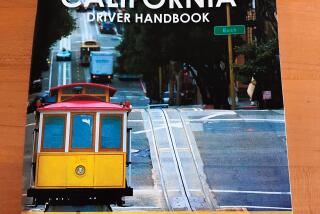Drivers not telling doctors of seizures
- Share via
State laws aimed at preventing people who suffer seizures from getting behind the wheel of a car may be having an unintended consequence: Patients aren’t telling doctors about these episodes for fear of losing their driving privileges.
Six states, including California, require doctors to notify health officials when a patient suffers a seizure. The laws aim to address the problem of uncontrolled seizures that can cause some people to black out while driving, posing a safety hazard to themselves and others.
But Stanford University researchers have found such laws may be driving a wedge between patients and their physicians.
In a survey of 400 adult epileptics, a significant number of the 207 who responded admitted they had withheld information about a seizure from their doctor or considered doing so because they were afraid of losing their driver’s licenses.
About 8.6% (16 of 187) of patients who answered a question about concealing seizure information said they had done so because they feared losing their license. Nearly 19% (34 of 183) of patients who answered a question about whether they’d ever considered concealing such information said they had.
“We can’t properly treat people if we don’t know if or when they’re having seizures,” said lead author Dr. Kamala Rodrigues, a neurologist in Ann Arbor, Mich., who conducted the research while at Stanford. The patients surveyed were seen at the Stanford Epilepsy Clinic in Palo Alto.
Among survey respondents, 44% were still driving and 77% had driven in the past. Among the 162 who had ever driven, 42% said their licenses had been suspended for medical reasons and 39% reported having been in a car accident. More than a quarter of those who had been in an accident believed it was caused by a seizure.
Although the surveys were anonymous, many patients did not answer questions about withholding seizure information from a doctor. The patients’ reticence to answer, Rodrigues believes, reflects the sensitivity of the subject.
Patients who had lost a license for medical reasons were more likely to conceal or consider concealing information. Among those with prior license suspensions who were willing to answer a question about it, 21 said they had either concealed information or thought about doing so; 41 said they hadn’t. But among those who had never lost a license and who responded to the same question, just 12 said they had concealed or considered concealing medical information; 67 had not.
Overall, the survey found that 4 of 5 patients would voluntarily stop driving if they had a seizure.
More to Read
Sign up for Essential California
The most important California stories and recommendations in your inbox every morning.
You may occasionally receive promotional content from the Los Angeles Times.













